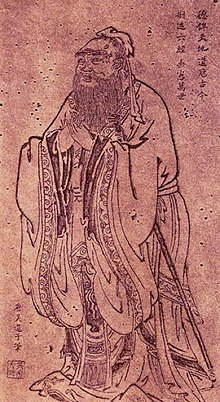Wu Daozi
Appearance
(Redirected from Wu Tao-tze)

Wu Daozi (680 – c. 760), also known as Daoxuan, was a Chinese painter of the Tang dynasty. The British art historian Michael Sullivan considers him one of "the masters of the seventh century," Some of his works survive; many, mostly murals, have been lost.
Quotes
[edit]- The greatest painter of the T’ang epoch, and, by common consent, of all the Far East, rose above distinctions of school, and belonged rather to the Buddhist tradition of Chinese art. Wu Tao-tze deserved his name—Wu, Master of the Tao or Way, for all those impressions and formless thoughts which Lao-tze and Chuang-tze had found too subtle for words seemed to flow naturally into line and color under his brush.
- Will Durant and Ariel Durant, The Story of Civilization, Book I, Our Oriental Heritage (1935) (IV. PAINTING 1. Masters of Chinese Painting)
- He excelled in every subject: men, gods, devils, Buddhas, birds, beasts, buildings, landscapes—all seemed to come naturally to his exuberant art. He painted with equal skill on silk, paper, and freshly-plastered walls; he made three hundred frescoes for Buddhist edifices, and one of these, containing more than a thousand figures, became as famous in China as “The Last Judgment” or “The Last Supper” in Europe. Ninety-three of his paintings were in the Imperial Gallery in the twelfth century, four hundred years after his death; but none remains anywhere today. His Buddhas, we are told, “fathomed the mysteries of life and death”; his picture of purgatory frightened some of the butchers and fishmongers of China into abandoning their scandalously un-Buddhistic trades; his representation of Ming Huang’s dream convinced the Emperor that Wu had had an identical vision.
- Will Durant and Ariel Durant, The Story of Civilization, Book I, Our Oriental Heritage (1935) (IV. PAINTING 1. Masters of Chinese Painting)
- So great was his reputation that when he was finishing some Buddhist figures at the Hsing-shan Temple, “the whole of Chang-an” came to see him add the finishing touches. Surrounded by this assemblage, says a Chinese historian of the ninth century, “he executed the haloes with so violent a rush and swirl that it seemed as though a whirlwind possessed his hand, and all who saw it cried that some god was helping him”: the lazy will always attribute genius to some “inspiration” that comes for mere waiting. When Wu had lived long enough, says a pretty tale, he painted a vast landscape, stepped into the mouth of a cave pictured in it, and was never seen again. Never had art known such mastery and delicacy of line.
- Will Durant and Ariel Durant, The Story of Civilization, Book I, Our Oriental Heritage (1935) (IV. PAINTING 1. Masters of Chinese Painting)

